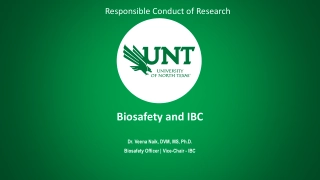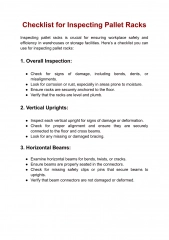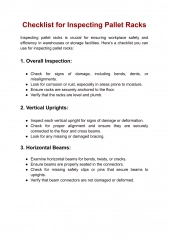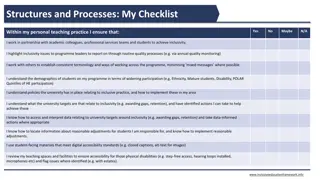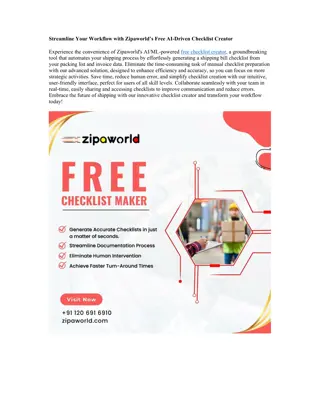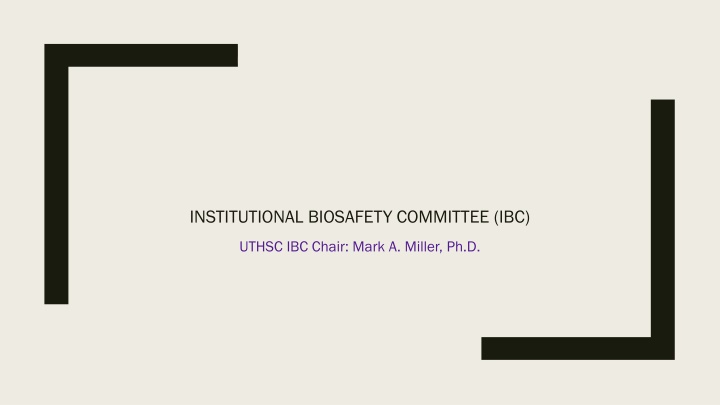
Compliance Checklist for Research Oversight and Biosafety Protocols
"Ensure proper compliance with research oversight and biosafety protocols through detailed checklists and training requirements. Learn about the roles of Institutional Biosafety Committee (IBC) and key compliance documentation."
Download Presentation

Please find below an Image/Link to download the presentation.
The content on the website is provided AS IS for your information and personal use only. It may not be sold, licensed, or shared on other websites without obtaining consent from the author. If you encounter any issues during the download, it is possible that the publisher has removed the file from their server.
You are allowed to download the files provided on this website for personal or commercial use, subject to the condition that they are used lawfully. All files are the property of their respective owners.
The content on the website is provided AS IS for your information and personal use only. It may not be sold, licensed, or shared on other websites without obtaining consent from the author.
E N D
Presentation Transcript
INSTITUTIONAL BIOSAFETY COMMITTEE (IBC) UTHSC IBC Chair: Mark A. Miller, Ph.D.
Purpose of the IBC NIH Office of Biotechnology Activities (OBA) requires all research Institutions to have an IBC the IBC reviews research protocols to ensure: that the a proper risk assessment has been performed that appropriate safety measures are being taken to mitigate the risks
Institutional Compliance: IBC The IBC coordinates with both the Institutional Review Board (IRB) and the Institutional Animal Use and Care Committee (IACUC) IRB protects the rights of human subjects IACUC ensures that all in vivo work is performed in accordance with the Animal Welfare Act and the Guide for the Care and Use of Laboratory Animals IBC ensures that all investigators understand the risks associated with their work These three committees collaborate to ensure that PIs have appropriate compliance documentation in place
UTHSC IBC Research Oversight IBC compliance/training requirements depends on the type of work that will be performed Work that requires full IBC Protocol approval Any work involving rDNA Any in vivo work involving agents that require BSL-2 containment In vivo studies with Risk Group 2 (RG2) or Risk Group 3 (RG3) infectious agents In vivo studies involving introduction of cells/materials derived from humans or non- human primates into research animals Any work (in vitro or in vivo) involving RG3 agents that require BSL-3 containment Work that requires notification of the IBC In vitro work with RG1/RG2 agents, toxins, human/non-human-primate-derived materials
Compliance Checklist Do you work with rDNA (either naturally Do you work with rDNA (either naturally- -derived or synthetic derived or synthetic)? )? Includes: plasmid DNA, recombinant viral vectors, recombinant infectious agents (any microbe that has been genetically manipulated), synthetic nucleic acids, etc. If Yes : If Yes : Required annual training Required annual training : (1) general laboratory/biosafety training and (2) IBC training Required IBC documentation Required IBC documentation: full IBC Protocol (submitted and approved before initiating work)
Compliance Checklist Do you work with any infectious agents (any bacterial, viral, fungal, or parasitic agents Do you work with any infectious agents (any bacterial, viral, fungal, or parasitic agents) )? If Yes : Required Required annual training annual training : general laboratory/biosafety training Required IBC documentation Required IBC documentation: Infectious Agents Usage form (submitted before initiating work)
Compliance Checklist Do you plan to perform studies in research animals that involve infectious agents Do you plan to perform studies in research animals that involve infectious agents? If Yes : Required Required annual training annual training : (1) general laboratory/biosafety training and (2) AALAS Learning Library online module on request by IACUC (not annual) Required IBC documentation Required IBC documentation: Infectious Agents Usage form (submitted before initiating work) Required IACUC documentation: IACUC protocol (submitted and approved before initiating work) required that you enroll in the Occupational Health Surveillance Program (contact University Health at 448-5630 for information). Is one or more of the infectious agents classified as Risk Group 2 or higher Is one or more of the infectious agents classified as Risk Group 2 or higher? Required IBC documentation Required IBC documentation: full IBC Protocol (submitted and approved before initiating the studies)
Compliance Checklist Do you work with human cell lines, primary cells from humans, or human tissues or other Do you work with human cell lines, primary cells from humans, or human tissues or other materials (serum, nasal washes, etc.) materials (serum, nasal washes, etc.)? If Yes : Required Required annual training annual training : (1) general laboratory/biosafety training and (2) Blood borne pathogen training Required IBC documentation Required IBC documentation: Human/ Non-Human Primate Materials Usage Form (submitted and approved before initiating work) IRB Documentation IRB Documentation: if the materials are not de-identified AND were not obtained from ATCC, you may need IRB approval (see IRB Getting Started Webpage)
Compliance Checklist Do you work with non Do you work with non- -human primate cell lines, primary cells from non human primate cell lines, primary cells from non- -human primates, or non human primate tissues or other materials human primate tissues or other materials? human primates, or non- - If Yes : Required Required annual training annual training : (1) general laboratory/biosafety training and (2) Blood borne pathogen training Required IBC documentation Required IBC documentation: Human/ Non-Human Primate Materials Usage Form (submitted and approved prior to initiating studies) Are any materials derived from the macaque genus? Required annual training Required annual training : Herpes B awareness training (contact lab animal care at 448-5656 for details)
Compliance Checklist Do you plan to perform studies in research animals that involve human Do you plan to perform studies in research animals that involve human- - or non derived materials (cell lines, primary cells/tissues, serum, nasal washes, etc derived materials (cell lines, primary cells/tissues, serum, nasal washes, etc.) .)? or non- -human primate human primate- - If Yes : Required Required annual training annual training : (1) general laboratory/biosafety training and (2) Blood borne pathogen training, and (3) AALAS Learning Library online module on request by IACUC (not annual) Required IBC documentation Required IBC documentation: full IBC Protocol (submitted and approved before initiating work) Required IACUC documentation: IACUC protocol (submitted and approved before initiating work)
Compliance Checklist Do you work with infectious agents that require BSL Do you work with infectious agents that require BSL- -3 containment 3 containment? If Yes : Required Required annual training annual training : (1) general laboratory/biosafety training and (2) BSL-3 safety training Required IBC documentation Required IBC documentation: (1) full IBC Protocol (submitted and approved before initiating work) and (2) RBL Project Request (see IBC or RBL website) Does the planned work involve use of infectious select agents? If Yes : Additional requirements must be met (contact Jennifer Stabenow at 448-6649 or Jstabeno@uthsc.edu)
Compliance Checklist Do you work with toxins and/or select agent toxins Do you work with toxins and/or select agent toxins? If Yes : Required Required annual training annual training : (1) general laboratory/biosafety training and (2) IBC training Required IBC documentation Required IBC documentation: Toxins Usage Form (submitted and approved before initiating work) Notifications prior to initiating work involving select toxins Notifications prior to initiating work involving select toxins: (1) Director of Research Safety Affairs [at 488-7374] and (2) UTHSC RO [at 448-6649]
Annual Safety Training General Laboratory/Biosafety Training (two options) General Laboratory/Biosafety Training (two options) In In person classroom training module: provided by Safety Affairs staff members (email: person classroom training module: provided by Safety Affairs staff members (email: labsafety@uthsc.edu labsafety@uthsc.edu); ); Available Available monthly monthly On On- -line training module: line training module: Skillsoft Skillsoft learning platform (accessible via Safety Affairs webpage) learning platform (accessible via Safety Affairs webpage) Annual Blood Borne Pathogen Training Annual Blood Borne Pathogen Training Skillsoft Skillsoft learning platform (accessible via Safety Affairs webpage) learning platform (accessible via Safety Affairs webpage)
Contacting the IBC If you have any questions relating to IBC approval/notification relating to your research If you have any questions relating to IBC approval/notification relating to your research activities, feel free to contact the IBC office for guidance: activities, feel free to contact the IBC office for guidance: Via email: Via email: IBC@uthsc.edu IBC@uthsc.edu Via phone: 448 Via phone: 448- -2164 2164

